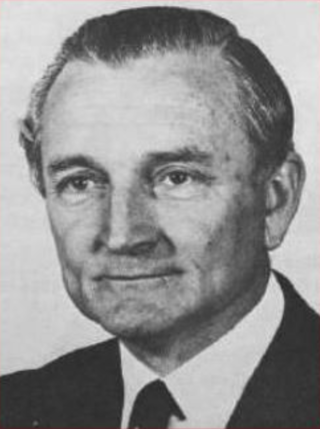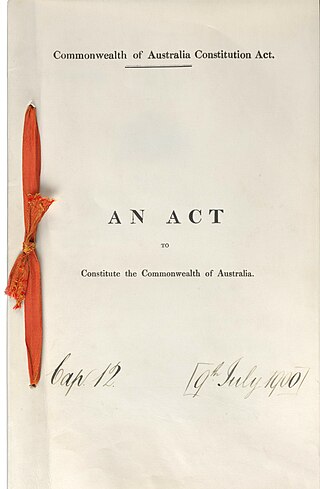Related Research Articles
Republicanism in Australia is a movement to change Australia's system of government from a constitutional monarchy to a republic; presumably, a form of parliamentary republic that would replace the monarch of Australia with a non-royal Australian head of state. It is opposed to monarchism in Australia. Republicanism was first espoused in Australia before Federation in 1901. After a period of decline following Federation, the movement again became prominent at the end of the 20th century after successive legal and socio-cultural changes loosened Australia's ties with the United Kingdom.

Nick Bolkus is a former Australian Labor Party politician. He was a member of the Senate from July 1981 to June 2005, representing the state of South Australia.
Malcolm Hugh Mackerras AO is an Australian psephologist and commentator and a lecturer on Australian and American politics.
Sir Harry Talbot Gibbs was Chief Justice of the High Court of Australia from 1981 to 1987 after serving as a member of the High Court between 1970 and 1981. He was known as one of Australia's leading federalist judges although he presided over the High Court when decisions such as Koowarta v Bjelke-Petersen in 1982 and Commonwealth v Tasmania expanded the powers of the Commonwealth at the expense of the states. Gibbs dissented from the majority verdict in both cases. On 3 August 2012, the Supreme Court of Queensland Library opened the Sir Harry Gibbs Legal Heritage Centre. It is the only legal heritage museum of its kind in Queensland and features a permanent exhibition dedicated to the life and legacy of Sir Harry Gibbs.

The Federation of Australia was the process by which the six separate British self-governing colonies of Queensland, New South Wales, Victoria, Tasmania, South Australia, and Western Australia agreed to unite and form the Commonwealth of Australia, establishing a system of federalism in Australia. The colonies of Fiji and New Zealand were originally part of this process, but they decided not to join the federation. Following federation, the six colonies that united to form the Commonwealth of Australia as states kept the systems of government that they had developed as separate colonies, but they also agreed to have a federal government that was responsible for matters concerning the whole nation. When the Constitution of Australia came into force, on 1 January 1901, the colonies collectively became states of the Commonwealth of Australia.
The solicitor-general of Australia is the country's second highest-ranking law officer, after the Attorney-General for Australia. The current officeholder is Stephen Donaghue, who took office on 16 January 2017 following the resignation of Justin Gleeson.

Sir John William Downer, KCMG, KC was an Australian politician who served two terms as Premier of South Australia, from 1885 to 1887 and again from 1892 to 1893. He later entered federal politics and served as a Senator for South Australia from 1901 to 1903. He was the first of four Australian politicians from the Downer family dynasty.

Joseph William Ludwig is an Australian barrister and retired politician. He was a member of the Australian Senate for the state of Queensland from July 1999 to May 2016, representing the Australian Labor Party. Ludwig served in a range of portfolios in the first Rudd and the second Gillard ministries until his resignation from Cabinet as the Minister for Agriculture, Fisheries and Forestry and Minister Assisting the Attorney-General on Queensland Floods Recovery, in 2013.
Patricia June O'Shane is a retired Australian teacher, barrister, public servant, jurist, and Aboriginal activist. She was Australia's first Aboriginal magistrate, serving the Local Court in Sydney, New South Wales, between 1986 until her retirement in 2013.

Russell Brunell Trood was a Liberal Party Senator for the state of Queensland, Australia. His surprise election as the third Liberal from Queensland in the 2004 Federal Election, along with 38 other Coalition Senators gave the federal government of John Howard a majority in the Senate and thus control of both houses of Parliament. He did not retain his seat in the 2010 Australian federal election. His term in the senate ended on 30 June 2011.

The politics of Australia operates under the written Australian Constitution, which sets out Australia as a constitutional monarchy, governed via a parliamentary democracy in the Westminster tradition. Australia is also a federation, where power is divided between the federal government and the states. The monarch, currently King Charles III, is the head of state and is represented locally by the governor-general, while the head of government is the prime minister, currently Anthony Albanese.
Michael Hugh Lavarch AO is an Australian lawyer, educator and former politician. He was the Attorney-General for Australia between 1993 and 1996, and from 2004 to 2012 was Executive Dean of the Faculty of Law at Queensland University of Technology (QUT), his alma mater, where he has been since then emeritus professor. As of August 2020 he is co-chair, with Jackie Huggins, of the Eminent Panel for the Indigenous treaty process in Queensland.
Lawrence Richard Dimond Pyke was an Australian headmaster and university dean. Referred to in print as LRD Pyke, this led to his nickname of "Lardy".

Sir John Leslie Carrick, was an Australian politician who served as a Senator for New South Wales from 1971 to 1987, representing the Liberal Party. He was a minister for the duration of the Fraser government, holding several different portfolios.

The Constitution of Australia is the fundamental law that governs the political structure of Australia. It is a written constitution, that establishes the country as a federation under a constitutional monarchy governed with a parliamentary system. Its eight chapters sets down the structure and powers of the three constituent parts of the federal level of government: the Parliament, the Executive Government and the Judicature.

Clive Frederick Palmer is an Australian businessman and former politician. He has iron ore, nickel, and coal holdings. Palmer owns many businesses such as Mineralogy, Waratah Coal, Queensland Nickel at Townsville, the Palmer Coolum Resort on the Sunshine Coast, Palmer Sea Reef Golf Course at Port Douglas, Palmer Colonial Golf Course at Robina, and the Palmer Gold Coast Golf Course, also at Robina. He owned Gold Coast United FC from 2008 to 2012. Palmer created the Palmer United Party in April 2013, winning the Sunshine Coast seat of Fairfax in the 2013 Australian federal election and sitting as an MP for one term.
Sir Maurice Hearne Byers was a noted Australian jurist and constitutional expert. He was the Commonwealth Solicitor-General from 1973 to 1983, in which capacity he played a role in the Gair Affair and the 1975 Australian constitutional crisis. He had an unmatched record of success in his appearances before the High Court of Australia, and he has been characterised as the finest lawyer never to have been appointed to the High Court.

Kim Rubenstein is an Australian legal scholar, lawyer and political candidate. She is a professor at the University of Canberra.
Anne Frances Twomey is an Australian academic and lawyer specialising in Australian constitutional law. She is currently the Professor of Constitutional Law and Director of the Constitutional Reform Unit at Sydney Law School at the University of Sydney. She is a regular commentator on legal and constitutional issues for the Australian media.
References
- 1 2 "John Pyke - Faculty of Law". Queensland University of Technology. Archived from the original on 2 February 2012. Retrieved 11 February 2012.
- ↑ Government Powers under a Federal Constitution: Constitutional Law in Australia Retrieved 17 February 2017.
- 1 2 "John Richard Pyke, Queensland Senate candidate, 2010 Federal Election". My Sunshine Coast. Retrieved 11 February 2012.
- ↑ "Pyke Family Tree". Polyplex. Retrieved 11 February 2012.
- ↑ "Pyke, Lillian Maxwell (1881–1927)". Australian Dictionary of Biography . Retrieved 11 February 2012.
- ↑ Newington College Register of Past Students 1863-1998 (Syd, 1999) pp161
- ↑ "Short History of Newington College". Newington College. Archived from the original on 1 September 2007. Retrieved 11 February 2012.
- ↑ "Alumni Sidneienses". University of Sydney . Retrieved 17 February 2017.
- ↑ "John Pyke - Biography". Queensland University of Technology. Archived from the original on 2 February 2012. Retrieved 11 February 2012.
- ↑ "John Pyke - Publications". Queensland University of Technology. Archived from the original on 2 February 2012. Retrieved 11 February 2012.